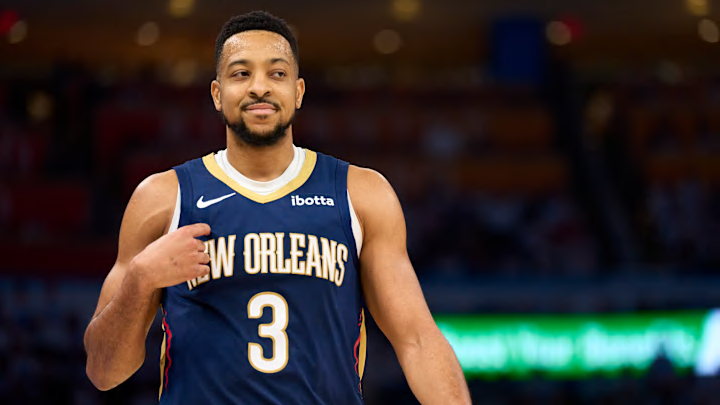NBA roster building is a tricky business. No matter how great a trade, draft pick, or free acquisition appears at first, there's always a chance that it doesn't pan out the way that the organization expects. Recently, there have been plenty of examples of "slam dunk" moves that didn't actually work out.
The Milwaukee Bucks traded for Damian Lillard ahead of the 2023-24 NBA season, pairing Giannis Antetokounmpo, an unstoppable force getting to the rim, with one of the greatest perimeter threats in the history of the game. On paper, it should have been a seamless fit that took the Bucks over the top. But, due to variety of unforeseen circumstances, Milwaukee wound up a first-round exit.
That's not to say that the Bucks can't turn it right around and win it all next year behind the Antetokounmpo and Lillard pairing, but it is a perfect example of how a trade can fail, even if the direct talent swap is an objective upgrade. So far, the Pelicans trade for CJ McCollum seems to be heading into that territory: one that will become another cautionary tale for overzealous franchises in the future.
CJ McCollum's fit in New Orleans has been questionable
Before I delve into the issues with CJ McCollum's role on the Pelicans, I want to take the time to give CJ his flowers. He spent the better part of his career playing second fiddle to Dame, one of the NBA's 75 greatest players ever according to the league itself. It's easy for a person to get lost under the cover of such an engulfing shadow, but CJ still managed to accumulate plenty of his own moments with the Portland Trail Blazers.
Then, when he was traded to the Pelicans, McCollum had to step up and become the requisite veteran for a team lacking in experience. Not only that, but he also had to take over as New Orleans's full-time point guard. He had always been a capable playmaker, but was obviously most comfortable as a scorer. Despite that, he commanded the Pelicans offense admirably and took a step back to allow Zion Williamson and Brandon Ingram to thrive and grow.
Passing isn't the only area of his game that CJ improved out of necessity. He's always been a good three-point shooter, but McCollum was most comfortable taking defenders off of the dribble and either slinking his way to the cup or pulling up for a patented midrange jumper. But, with the Pelicans featuring two stars who prefer to do their work inside the arc, CJ had to up his deep-shooting game, and he did exactly that.
Due in large part to CJ's presence, the Pelicans made the playoffs two out of the three years since he arrived in the Big Easy. That's a testament to the impact he's had as both an on-court floor general and as a sage veteran in the locker room.
Should the Pelicans look to move on from CJ McCollum?
We've established that CJ proved himself as an elite player in his own right after being freed from Dame's shadow, improved to fit the needs of his new team, and led his squad to greater highs in New Orleans. But, ultimately, the Pelicans are still far from a true title contender, and they may need to flip CJ again to take themselves over the hump.
Despite his best efforts, CJ will never be a pure point guard, which is something that the Pelicans desperately need. This summer, the team doubled-down on their previous mistake and acquired another ball-needy, score-first guard by trading for Dejounte Murray. The hope is that their conglomerate of secondary playmakers will overcome their lack of a true floor general. Usually, that doesn't work out the way teams hope. Look at the Boston Celtics, who faltered over and over again with their revolving door of failed point guards before finally winning it all after acquiring Jrue Holiday.
Between CJ, Murray, BI, and Zion, the Pelicans have almost an entire lineup filled with on-ball scorers who do their most damage inside of the arc. Considering the fact that New Orleans just traded for Murray, it's only logical that they'll choose him over CJ if they need to break up their new backcourt. Plus, Murray's age and defensive potential theoretically makes him a better fit next to Zion moving forward.
With just two years left on his deal and an average salary of $32 million, CJ has a very palatable contract that should attract contending hopefuls in need of a little extra perimeter scoring. If New Orleans does end up moving on from McCollum, hopefully they'll have learned their lesson from acquiring him in the first place and prioritize fit in whatever package they take back.
